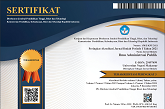Practical Model of Organizational Personnel Competence Initiation Via Competency Based Interview
(1) Institut Ilmu Sosial dan Ilmu Politik Yapis Biak Papua
(*) Corresponding Author
DOI: https://doi.org/10.26858/jiap.v9i2.12309
Abstract
The phenomenon of the quality of human resources in organizations, commonly discussed in a broad general framework. Even the arguments presented in the general context even tend to lose practical focus, including when examining the competence of organizational personnel. In this study, experimentation is carried out by placing competencies as initial access to the quality of organizational personnel resources, then the focus is directed at the recruitment program. This study considers that the recruitment program is the first opportunity for the organization to pay attention to the ability (quality of HR) of prospective personnel who will work later. This perspective brings us to the importance of professional recruitment filtration design and integrity in its implementation. The two aspects support one another, including in; (1) The recruitment filtration process that applies the interview mechanism requires the design of competency-based interviews whose details are examined; (2) Competency-based interview design is implemented with blind professional integrity. For this reason, this study presents a practical model of competency-based interview design that is ready to be implemented with a single condition, blind professional integrity.
Keywords
Full Text:
PDFReferences
Atkinson, R., Crawford, L., & Ward, S. (2006). Fundamental uncertainties in projects and the scope of project management. International Journal of Project Management, 24(8), 687–698.
Blackhurst*, J., Craighead, C. W., Elkins, D., & Handfield, R. B. (2005). An empirically derived agenda of critical research issues for managing supply-chain disruptions. International Journal of Production Research, 43(19), 4067–4081.
Chenail, R. J. (2011). Ten Steps for Conceptualizing and Conducting Qualitative Research Studies in a Pragmatically Curious Manner. Qualitative Report, 16(6), 1713–1730.
Collins, A., Joseph, D., & Bielaczyc, K. (2004). Design research: Theoretical and methodological issues. The Journal of the Learning Sciences, 13(1), 15–42.
Currie, G., & Darby, R. (1995). Competence‐based management development: rhetoric and reality. Journal of European Industrial Training.
Donelly, J. H., Gibson, J. L., & Ivancevich, J. (1994). Fundamental of Management, Texas: Business Publication.
Fayol, H. (1916). General principles of management. Classics of Organization Theory, 2, 15.
Fitzgerald, L., Lilley, C., Ferlie, E., Addicott, R., McGivern, G., & Buchanan, D. (2006). Managing change and role enactment in the professionalised organisation. London: NCCSDO.
Glyricidia, A. (2017). Merancang Competency Based Human Resources Management (CBHRM) PT. Corak Warna Advertising Bandung.
Ismail, A., Sulur, A. H., Akib, H., & Salam, R. (2016). Snapshot of Society Social-Economic Welfare based on Human Development Index in Polewali Mandar Regency, Indonesia. International Conference on Public Organization VI (ICONPO VI), 847–858.
Jamaluddin, J., Salam, R., Yunus, H., & Akib, H. (2017). Pengaruh Budaya Organisasi terhadap Kinerja Pegawai pada Dinas Pendidikan Provinsi Sulawesi Selatan. Jurnal Ad’ministrare, 4(1), 25–34.
Kulvisaechana, S. (2005). The rhetoric and reality of developing human capital in the organization: a case study. University of Cambridge.
Lam, A. (1998). Tacit knowledge, organisational learning and innovation: a societal perspective (Vol. 98). DRUID.
Lent, R. W., Brown, S. D., & Hackett, G. (1994). Toward a unifying social cognitive theory of career and academic interest, choice, and performance. Journal of Vocational Behavior, 45(1), 79–122.
Mitroff, I. I., & Denton, E. A. (1999). A study of spirituality in the workplace. Sloan Management Review, 40(4), 83–84.
Sachs, J. D., & McArthur, J. W. (2005). The millennium project: a plan for meeting the millennium development goals. The Lancet, 365(9456), 347–353.
Saggaf, S., Salam, R., Kahar, F., & Akib, H. (2014). Pelayanan Fungsi Administrasi Perkantoran Modern. Jurnal Ad’ministrare, 1(1), 20–27.
Salam, R. (2015). Penerapan Fungsi Administrasi Perkantoran Modern berbasis Daya Saing Organisasi dalam menyongsong MEA 2015. SEMINAR NASIONAL “Revolusi Mental Dan Kemandirian Bangsa Melalui Pendidikan Ilmu-Ilmu Sosial Dalam Menghadapi MEA 2015” Himpunan Sarjana Pendidikan Ilmu-Ilmu Sosial Indonesia, 1, 186–190.
Sols, A., Nowick, D., & Verma, D. (2007). Defining the fundamental framework of an effective performance-based logistics (PBL) contract. Engineering Management Journal, 19(2), 40–50.
Spencer, L. M., & Spencer, P. S. M. (2008). Competence at Work models for superior performance. John Wiley & Sons.
Toth, I. (2015). Benefits of Managing Organizational Capability.
Zwell, M. (2008). Creating a Culture of Competence. New York: Jhon Wiley and Sons. Inc.
Article Metrics
Abstract view : 1014 times | PDF view : 371 timesRefbacks
- There are currently no refbacks.
Copyright (c) 2020 Djamil Hasim

This work is licensed under a Creative Commons Attribution 4.0 International License.
Diterbitkan oleh:
Program Studi Ilmu Administrasi Publik
Program Pascasarjana Universitas Negeri Makassar
JIAP Index By:

This work is licensed under a Creative Commons Attribution 4.0 International License.









